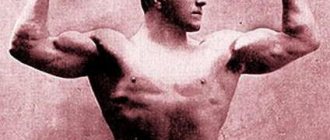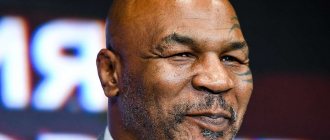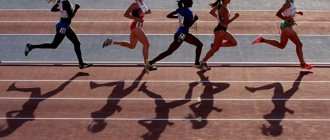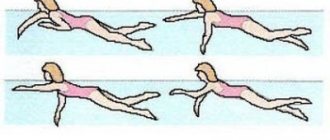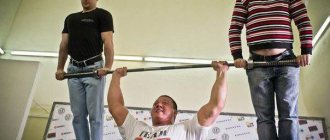In our country, such a sport as weightlifting is viewed in two ways. Many simply cannot look at how people bend under incredible weights, while others, on the contrary, like to look at the pumped up bodies of athletes who fight without sparing themselves in various competitions.
Today Stone Forest tells you the life story of Soviet weightlifter Leonid Zhabotinsky, two-time Olympic champion, four-time world champion, two-time European champion and five-time USSR champion, who is rightfully considered a giant in this sport and the idol of Arnold Schwarzenegger himself.
Under occupation
The legendary weightlifter Leonid Zhabotinsky, whose biography and photo are presented to your attention in the article, was born in the middle of winter of 1938 in one of the villages of the Sumy province. The father of the future athlete, Ivan Filippovich, was involved in amateur sports. It was he who instilled in his son a craving for this healthy lifestyle.
Leonid's mother's name was Efrosinya (nee Severina). The parents of the future athlete also had another son, Vladimir.
In 1941, the Jabotinskys moved to Kharkov. When the war began, they were in the city. Soon, Hitler's troops captured this territory, and the whole family was occupied.
Two years later, Kharkov was liberated by the Red Army.
Post-war time
The biography of Leonid Ivanovich Zhabotinsky in the post-war period was not simple. Despite the fact that the war ended soon, the following years also turned out to be quite difficult and hungry. That is why, after graduating from eighth grade, Leonid began working at a tractor factory in Kharkov to help his family. There he learned turning skills. In addition, his workshop master was one of the public boxing trainers, and young Leonid also decided to devote himself to this sport.
Note that even before employment, the young man also enrolled in the athletics section. On the initiative of his father, he visited the stadium, where he practiced discus throwing and shot put. By the way, Leni’s dad bought him a sports bike to celebrate.
Being a turner, Leonid often looked into the gym where weightlifters trained. The barbell truly beckoned him. As a result, he could not resist and ended up in this section.
Of course, working at a tractor factory and playing sports in three sections was very difficult. Nevertheless, the mentors could not help but notice the tenacity of the young Jabotinsky. Each of them tried to convince the future athlete to start training exclusively with him. Thus, weightlifting coach M. Svetlichny invited his students to one of the demonstration performances of famous weightlifters. When the future athlete saw how the eminent athlete and world champion G. Novak demonstrated his abilities, all his doubts were completely dispelled. Leonid began to seriously engage in weightlifting.
INTERCLOSURE
However, let’s listen to Leonid Ivanovich.
“Everything was decided in the clean and jerk. They give me 200, Vlasov - 205. We both cope with the initial weights and secure the first two places on the podium. Victory is ours, this is the main thing! And only after this the tactical game begins.
Medvedev and I are waiting to see what weight Vlasov orders. He goes to 210 - and pushes. To catch up and get ahead of Yuri, I need to go to 217.5 - two kilograms higher than the world record. I have two approaches in stock - my opponent has one. Each of us is waiting to see what weight our opponent will go to. Sidorich persuades him not to rush, to first approach 212.5. I am adamant: we won’t rush, and what could this weight do? Nothing.
We reorder to 217.5. I'm going to the platform. I grab the bar, try to straighten up - I have a craving: I remove the apparatus from the platform, pull and throw. Raised above the knees - the approach counts.
Now it’s Vlasov’s turn. I had no doubt that he would take this weight, and was already mentally preparing to add the 7.5 kilos that were missing before victory. In training, I was able to handle heavy weights; I was ready to push even 230. And then, when not only a medal, but a record and victory loomed on the horizon, courage began.
We look, the three minutes allotted for the attempt are running out, and there are no movements from the “Vlasov camp”. That's it, I say, you need to declare 222.5. We were about to announce our decision, but Vlasov suddenly went to the platform.
I didn’t see anything, but I realized from the loud sigh of disappointment that the approach had failed. I don’t need to add anything anymore. I go out into the gym, as always, mentally going through all the movements. I heard a warning signal - there was a minute left, it triggered in my head. He abruptly approached the projectile, grabbed it, took it on his chest, and stood up. Further – it’s easier. In all the years of performing, it has never happened that I didn’t push from my chest. But this is a special case.
I pushed and held. The senior on the platform was the Englishman Oscar State
, not our greatest friend, to put it mildly. I waited for his command “Down!” - lower it, that is. And I'm holding it. State jumped up from his seat, waving his hand - put it down, they say, that's enough. That’s when I gently, gently, as if afraid of breaking a glass vessel, carefully placed the projectile on the platform. All…".
Surprisingly, the legendary battle between Vlasov and Jabotinsky is almost not represented in any way in the official film of the Tokyo Games, which is traditionally made by order of the IOC. All that can be found in it is Jabotinsky’s winning attempt
. And even these few seconds give an idea of why the rivalry of half a century ago is considered by many to be the very best in the history of world weightlifting.
First successes
At the age of 19, Jabotinsky became a student at a pedagogical institute, and 6 years later he became a certified specialist.
Over the years, the weightlifter took part in the Ukrainian Championship. By this time he still did not have enough experience, but he was still able to become a bronze medalist. A little later, the athlete became a master of sports.
And in 1963, Leonid managed to set the first world record: he then managed a weight of 165 kg in the snatch exercise. Also, by this period, he was already a full-fledged member of the Soviet team and was able to win bronze at the world championship among weightlifters in the Swedish capital.
Clash of the Titans
In 1964, Leonid Ivanovich Zhabotinsky went to the Olympic Games in the capital of the Land of the Rising Sun. It is believed that this was the most successful performance in Jabotinsky’s sports career. Journalists and commentators called this fight nothing less than a battle of the titans.
The fact is that it was at the Tokyo Olympics that the long-awaited meeting took place between the strongest people on the planet - Yu. Vlasov and L. Zhabotinsky. By the way, some did not even take into account the weightlifter from the USA N. Shemansky.
The huge Shibuya Hall, where the competition between two Soviet athletes was held, could not accommodate all the sports fans. The Japanese publication will subsequently write on its pages: “If you haven’t seen the fight between Jabotinsky and Vlasov, then you haven’t seen the Olympics at all.”
So, on this day, Jabotinsky was ten kilograms behind his opponent in total. Nevertheless, he decided to order a weight that was phenomenal at that time - 217.5 kg - in the clean and jerk, and he managed it. He managed not only to set a world record, but also to take Olympic gold.
By the way, the athlete was able to repeat this success at the next Olympic Games, which were held in Mexico City.
Thus, by 1968, Jabotinsky was already the first 2-time Olympic champion in the heavyweight division. He could have won the Olympics in Munich in 1972. He admitted then that he would not doubt victory. But history does not tolerate the subjunctive mood. The athlete was not present at the games.
Leonid Zhabotinsky: biography
Leonid Ivanovich Zhabotinsky is an iconic Soviet athlete whose achievements are very difficult to overestimate. The Ukrainian weightlifter set a lot of world records and received a whole bunch of awards. What is there, once “Iron Arnie” himself admitted that Leonid Zhabotinsky was a real idol for him, an example to follow. After reading this article, you will learn the story of this legendary Soviet athlete.
Trauma and rehabilitation
After the Tokyo Olympics, Jabotinsky continued to set new records and defeated opponents at world championships.
However, while performing at the next world championship in the Polish capital in 1969, the athlete felt acute pain in his back. Of course, he decided to refuse further competitions.
Doctors began to examine him: the athlete required urgent surgical intervention.
Rehabilitation was very difficult. A full-time specialist of the Soviet team, the famous Anatoly Kashpirovsky, helped him recover psychologically. According to recollections, this psychologist always knew how to support an athlete.
As a result, the rehabilitation period lasted four years. Leonid Ivanovich Zhabotinsky worked hard to return to his previous form. In 1973, he found strength and returned to big-time sports.
Leonid Ivanovich Zhabotinsky now
The name of Leonid Ivanovich Zhabotinsky is immortalized in his greatest achievements, in the hearts of millions of fans and admirers around the world. The Koshevoy Ataman in the diorama “Military Rada in the Sich” of the Museum of the History of the Zaporizhian Cossacks was written from Zhabotinsky.
Sports school for weightlifting "Spartak" bears his name. Every year, tournaments for the Leonid Zhabotinsky Prize are held in Zaporozhye.
In memory of him, a street was named in Zaporozhye and a memorial plaque was unveiled on the house where he lived. Near the Alley of Honorary Citizens of the city, a bronze monument was erected to him and a coin of 2 hryvnia was issued.
And also read: Legendary athlete of the past - Louis Cyr → Alexander Zass “Iron Samson” → Ivan Poddubny - Russian strongman →
Return
This year the athlete took part in the Soviet Union Championship. It was there that he managed to win his next long-awaited victory after injury. Then he was able to set a new world record. You can see a photo of Leonid Zhabotinsky in the article.
And the next year the weightlifter went to the Armed Forces Championship. He established his last achievement there. We are talking about a snatch of 185.5 kg.
After the triumph
After this, Jabotinsky was forced to end his sports career. He underwent two new surgeries. He was diagnosed with peritonitis, and the weightlifter also received a most offensive injury on his knee. The athlete was then in Crimea. Once, while playing volleyball, he had to land poorly on his foot. The meniscus burst under the athlete's own weight.
Despite this, Jabotinsky did not immediately turn to doctors. But when the pain became even stronger, he came to the surgeon.
The verdict of the doctors was absolutely unequivocal: we would have to part with big sport forever. And then Leonid Zhabotinsky decided to take up coaching.
EPILOGUE. “CONFIRMING DATING”
When I brought the finished material for a visa to a known address, I had to go through the already familiar procedure again, only now it was called “consolidating an acquaintance.” The author of the monologue had almost no comments, and a day later the next, 73rd, chapter of “Life Lessons” was published.
It just so happened that I never met Leonid Ivanovich again. True, I ran into the two-time Olympic champion, multiple world, European and USSR champion, candidate of pedagogical sciences, Professor Zhabotinsky several times at various parties - the same Olympian Balls, but for some reason he passed by. Well, okay, I'm not offended. The main thing is that now I can tell the truth about what happened half a century ago.
Leonid Zhabotinsky on the highest step of the podium
Soviet coach
When Jabotinsky finished his sports career, he worked for several years as a mentor to the Armed Forces national team.
When Perestroika began, the athlete went to Madagascar. He worked as a military adviser and trained Soviet weightlifters there.
In 1991, Jabotinsky decided to retire to the reserve.
For several years he worked at the Institute of Entrepreneurship and Law in the Russian capital. He was one of the vice-rectors of the university and supervised security and educational work.
Naturally, throughout his career, Jabotinsky received a huge number of prestigious titles, awards and titles. Thus, he was the honorary president of the weightlifting federation and was the founder of his own charitable foundation. This organization was engaged not only in supporting young athletes, but also provided all possible assistance in the rehabilitation of veteran athletes.
In addition, on the territory of Zaporozhye, on the initiative of Zhabotinsky, a weightlifting club was opened.
It is curious that, as a pensioner, he was once a member of the motor sports team of the capital’s traffic police. As a participant, he performed at starts in Holland, Italy, Hungary…. And once he even won one stage of this auto racing.
Personal life of the champion
Was weightlifter Leonid Zhabotinsky married? The biography and personal life of the athlete has always interested his fans. The only wife of the great athlete was called Raisa. She is the same age as her husband. Their acquaintance occurred in the late 60s, when Zhabotinsky himself participated in regular competitions in Zaporozhye. After one of the performances, he found himself at a concert of the famous Tarapunka and Shtepsel, where his future wife was also present.
After some time, the couple had children: two sons. The first-born Ruslan was born in 1962. By the way, he was the vice-president of the Zaporozhye Weightlifting Federation. He also wrote a book about his father. The youngest son, Vilen, was born in 1969. Note that all sons are masters of sports in weightlifting.
Training and nutrition
The main movements in weightlifting are the clean and jerk of the barbell. Leonid Zhabotinsky's training was aimed at increasing strength and correct technique for performing these exercises. Mandatory training was carried out at least three times a week.
The diet of Soviet athletes was high in calories and fairly balanced, and the state took care of this. Weightlifters received additional food stamps.
Meeting with Iron Arnie
It is noteworthy that in 1966, the titled athlete Leonid Zhabotinsky met with the 19-year-old strongman Arnold Schwarzenegger. The Soviet athlete was then in Austria to celebrate the birthday of the Communist Party of that state. The Olympic champion was the guest of honor at the event. The aspiring athlete Schwarzenegger also approached him for an autograph.
Almost forty years later, Jabotinsky was invited to America to the Arnold Classic tournament as a guest. Moreover, the invitation was received from Arnold Schwarzenegger himself, who was then the governor of California.
As a result, Jabotinsky went to the United States, where he had a second meeting with the iron Arnie, who received him at the highest level, with security, and settled him in a luxurious room.
And at the solemn ceremony, the governor presented his idol with a prize made to special order from rock crystal.
According to recollections, famous athletes talked about sports, events in politics and personal life. During the conversation, it turned out that the American bodybuilder was an ardent fan of Jabotinsky when the latter took part in the Tokyo Olympics.
Returning from America, Jabotinsky continued to communicate with Schwarzenegger. They corresponded constantly by email. By the way, the governor of California tried to be one of the first to congratulate the former champion on his birthday. In addition, Arnold was invited to come to Ukraine, but this, unfortunately, did not happen.
OLYMPICS WITHOUT TV BROADCASTS
50 years have passed since that memorable rivalry, but disputes about the events of October 18, 1964 do not stop. This half-century anniversary passed somehow casually, without much fanfare. It's a pity. This fall marks the 50th anniversary of the 1964 Summer Olympics in Tokyo.
“The good-natured owner began from the threshold: “Until we get to know each other better, I won’t tell you anything.” By the words “to get to know each other better,” Leonid Ivanovich meant a specific libation.”
I, at that time a first-year student at the Gorky Foreign Languages School, who, however, had already appeared on the pages of Soviet Sport, mainly with reports on the Torpedo hockey matches and the Volga football matches, had to follow what was happening primarily based on materials from the only all-Union sports newspaper at that time and other periodicals: to be honest, I don’t remember about television broadcasts. Yes, it seems that they were not there at all: black and white screens of Kaveens with lenses, “Tempov”, “Ekranov”, “Voronezhi” with “Horizons” were already shining in many apartments. Not around the clock, of course. However, due to the time difference, the Soviet leadership could not allow live broadcasts from Tokyo in the morning hours (read: during working hours). Perhaps somewhere in the Far East. So, if we learned about the victories of our athletes promptly, it was more on the radio or in television news. I got the details from newspapers.
Most of all, I remember, I was interested in what was happening on the weightlifting platform and on the fencing tracks. Here everything was explained simply: at the previous Games of 1960 in Rome, three of my fellow countrymen won Olympic gold: weightlifter Viktor Bushuev
and fencers
Lyudmila Shishova and German Sveshnikov
.
In addition, Shishova and Sveshnikov were in Tokyo for their second Olympics. And I was already familiar with German Aleksandrovich thanks to my teacher in journalism Mikhail Marin
, with whom the famous rapier player was friends, even once visiting the champion’s home.
In addition to the general hype, I still remember: “Soviet athletes were ahead of the Americans in terms of the number of medals won and in the overall team competition” (although all over the world, even in those days, the team that won more gold medals was put in first place) - three episodes from the technical program were preserved Games The unique rivalry between the two greatest weightlifters of that time, Yuri Vlasov and Leonid Zhabotinsky
, the brilliant victory of the Soviet team in the team foil final and the gold of Valery Brumel, who in those years was well known and visible to everyone.
The end of titan
The governor was involved in a car accident on his motorcycle. As a result, he received eighteen stitches on his face. Then Jabotinsky himself began to get very sick. First, his diseased kidney was removed. Then for three months he was in one of the hospitals due to a broken leg. Once again he was operated on. After which he was diagnosed with a microstroke. But all these misadventures are not over yet. Jabotinsky contracted the flu. The consequence of this disease was intestinal thrombosis.
At the beginning of January 2016, the former champion was operated on again. His thrombosed intestine was removed. Alas, on January 14 of the same year, the outstanding athlete passed away. He was buried in his homeland, in Zaporozhye.

